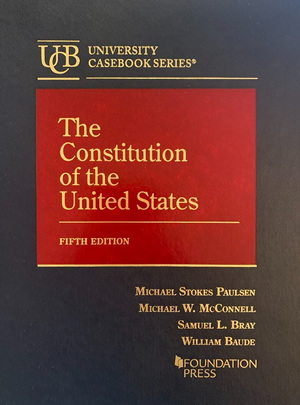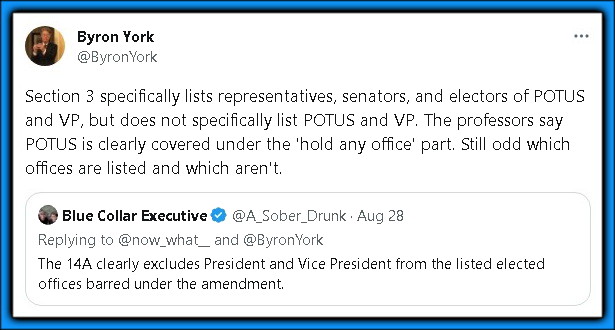JIM G. said this:
- “I see nothing in the Constitution that requires there be a conviction in order to disqualify a person from running.”
To which I MERELY SAY:
- “I see nothing in the 14th Amendment including the President or Vice President in the outcome. In fact, I see language excluding them.”
Let “me” explain.
★ ★ ★ ★ ★ ★ ★ ★ ★ ★ ★ ★ 14th AMENDMENT ★ ★ ★ ★ ★ ★ ★ ★ ★ ★ ★ ★
No person shall be a Senator or Representative in Congress, or elector of President and Vice President, or hold any office, civil or military, under the United States, or under any state, who, having previously taken an oath, as a member of Congress, or as an officer of the United States, or as a member of any state legislature, or as an executive or judicial officer of any state, to support the Constitution of the United States, shall have engaged in insurrection or rebellion against the same, or given aid or comfort to the enemies thereof. But Congress may by a vote of two-thirds of each House, remove such disability.
AN UPDATE
Before continuing however I wish to update a previous news piece noted in a connected post from YAHOO NEWS, which said:
- A Florida lawyer is challenging former President Trump’s ability to run for president in 2024 under the U.S. Constitution’s 14th Amendment, citing the Jan. 6, 2021, Capitol attack. Lawrence Caplan, a tax attorney in Palm Beach County, filed the challenge in federal court Thursday, pointing to a clause in the amendment that says those who “have engaged in insurrection or rebellion” against the government cannot hold office.
The update ends like all the other attempts at this novel legal theory and misreading of the 14th Amendment – failure. The update to this story is this JUST THE NEWS:
- A federal judge dismissed a lawsuit brought by a Florida tax attorney that claimed former President Donald Trump could not run for office on the basis of fomenting an insurrection.
… CONTINUING
BREITBART has a good short article discussing the idea a bit when they say:
The text specifically lists “Senator,” Representative,” and “elector of President and Vice President,” but does not specifically mention the president or vice president. Some of those who advocate using Section 3 to disqualify Trump suggest that the president falls under the category of “any office.” Law professors William Baude and Michael Stokes Paulsen argue, for example, that the language of Section 3 must be interpreted broadly.
But there is also the legal convention of expressio unius est exclusio alterius (“the express mention of one thing excludes all others”), meaning that if a list omits something, it is presumed to have done so deliberately.
Again, another source likewise notes the idea:
- Expressio unius est exclusio alterius | A Latin term literally meaning “the expression of one thing is the exclusion of the other”. This is a common law principle for construing legislation which holds that a syntactical presumption may be made that an express reference to one matter excludes other matters. (THOMPSON REUTERS PRACTICAL LAW)
Section 3 specifically lists representatives, senators, and electors of POTUS and VP, but does not specifically list POTUS and VP. Clearly the 14th excludes the President and Vice President from the listed elected offices barred under the amendment.
Byron York in his WASHINGTON EXAMINER post shows the recent arguments from those that wish to remove Trump — then goes on to explain how these arguments fail. (Michael McConnell is a contributing author to the book on the right)
It all seems a little too simple, doesn’t it? A voice of caution in all this comes from Michael McConnell. First, McConnell is skeptical about applying the word “insurrection” to the events of Jan. 6, 2021. “Section 3 speaks of ‘insurrection’ and ‘rebellion,'” he wrote. “These are demanding terms, connoting only the most serious of uprisings against the government, such as the Whisky Rebellion and the Civil War. The terms of Section 3 should not be defined down to include mere riots or civil disturbances, which are common in United States history. Many of these riots impede the lawful operations of government, and exceed the power of normal law enforcement to control. Are they insurrections or rebellions, within the meaning of Section 3?”
McConnell continued: “I would hazard the suggestion that a riot is the use of violence to express anger or to attempt to coerce the government to take certain actions, while insurrections and rebellions are the use of violence, usually on a larger scale, to overthrow the government or prevent it from being able to govern.”
Again, the widely accepted and understood legal convention is “if a list omits something, it is presumed to have done so deliberately.” Another TWEET I liked was this one:
Art. VI, § 3 where the Constitution lists who is required to swear or affirm to support the Constitution, the President is NOT included in the broad category of “executive officers”. That’s because Art. II S 8 specifies the oath (different from that of an officer) required by the President. There is no title of Commander in Chief in any military or govt branch. It’s exclusive.
Obviously the framers viewed the President as something greater than an executive officer.
14th amd. Sec3 DOES amend qualifications for Congress by textually excluding former members guilty of insurrection. It also textually excludes insurrectionists from being POTUS electors. BUT it avoids textually excluding or including a former POTUS because there again he is not an officer. The framers obviously didn’t go there. In the 2nd bogus impeachment trial Trump was acquitted of inciting an insurrection by the Senate, a branch of the US govt. The opinion that he is constitutionally barred is flawed, easily debunked and an insane interpretation!
this shortened video of Crossroads (EPOCH-TV):
